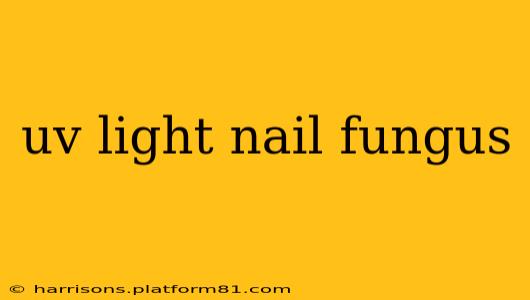Nail fungus, or onychomycosis, is a common and persistent problem affecting millions. While numerous treatments exist, many turn to UV light therapy as a potential solution. But does UV light actually work to treat nail fungus? Let's delve into the science and explore the effectiveness of this method.
What is Nail Fungus?
Before discussing UV light, understanding nail fungus is crucial. It's a fungal infection that typically affects the toenails, though fingernails can also be affected. The infection begins in the nail bed and gradually spreads, causing discoloration (yellowing, browning, or whitening), thickening, and crumbling of the nail. Several types of fungi can cause onychomycosis, making diagnosis and treatment challenging. Symptoms can range from mild discoloration to severe nail deformation and pain.
Does UV Light Kill Nail Fungus?
The short answer is: it's complicated. While UV light, particularly UVB light, has shown some efficacy in killing fungi in laboratory settings, its effectiveness in treating nail fungus in real-world scenarios is limited. The reason lies in the nail's structure. The nail plate acts as a barrier, preventing UV light from effectively penetrating and reaching the fungal infection deep within the nail bed. Therefore, surface-level exposure to UV light may kill some fungi, but it's unlikely to eradicate the infection completely.
What are the Different Types of UV Light Used for Nail Fungus?
Several types of UV light are used in various medical treatments, but the specific wavelengths effective against fungi vary. Narrowband UVB phototherapy, for example, has been studied for its efficacy in treating skin conditions involving fungi. However, the application and effectiveness concerning nail fungus remain debated. UV light treatment options for nail fungus often involve specialized lamps and may be part of a broader treatment plan, not a standalone cure.
Can UV Light Therapy Cure Nail Fungus?
No, UV light therapy alone is not a cure for nail fungus. While it might provide some improvement in mild cases or when used in conjunction with other treatments, it's insufficient to fully eradicate the infection in most instances. Consider it a supplementary treatment rather than a primary solution.
What are the Other Treatments for Nail Fungus?
Several effective treatments exist for nail fungus, including:
- Topical antifungal medications: These creams, ointments, or nail lacquers are applied directly to the affected nail.
- Oral antifungal medications: These pills are taken orally and are more effective for severe infections.
- Laser therapy: This relatively new treatment uses a laser to destroy the fungus within the nail.
- Surgical removal of the nail: In severe cases, the nail may need to be surgically removed to allow for better penetration of antifungal medications.
It's crucial to consult a podiatrist or dermatologist for a proper diagnosis and personalized treatment plan. Self-treating nail fungus can prolong the infection and potentially lead to complications.
Is UV Light Safe for Treating Nail Fungus?
While generally safe when used as directed, UV light exposure carries risks. Overexposure can lead to sunburn, skin damage, and an increased risk of skin cancer. Therefore, professional guidance is paramount when considering UV light therapy for nail fungus. Never attempt UV light treatment at home without consultation.
How Long Does it Take to See Results from UV Light Therapy for Nail Fungus?
The timeframe for noticing any improvement from UV light therapy is highly variable and depends on several factors, including the severity of the infection and the individual's response. Often, combined treatment approaches are required, and improvements may not be apparent immediately.
In conclusion, UV light might play a minor role in a comprehensive nail fungus treatment plan, but it's not a standalone cure. Always consult a healthcare professional for proper diagnosis and treatment. The information provided here is for general knowledge and should not be considered medical advice.
